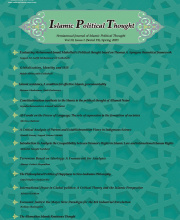۱.
کلیدواژهها:
religion Democracy reciprocal services suffrage answerable government pluralism
Religion has always been an inseparable component of political, social, and cultural life of Iranian people. Democracy as a western phenomenon has also been theoretically and in spoken as well as written form publicized in Iran for 100 years. The present article is an attempt to show to what extent religion has served democracy in Iran and vice versa. Elaborating on the type of interaction between religion and democracy in Iran, this article concludes that religion has believed democracy more than the latter having served the former. As a result, if religion had not entered the field of politics in Iran, it was quite likely that there would not have been any manifestations of democracy here.
۲.
کلیدواژهها:
sovereignty constitutional laws the Islamic Republic of Iran Democracy legitimacy
The question of dominance in human thoughts was associated with the formation of the first governmental organizations in the history. In this direction, a fundamental question that emerged in political and legal realm is search for the origin of power and sovereignty of government. There are two viewpoints on this matter, namely the perspective of God's sovereignty and the viewpoint of people's dominance. This paper will study the concept of sovereignty along with its impressions, beside explanation of the meaning of political sovereignty, and theories related to it in the constitutional laws of the Islamic Republic of Iran.
۳.
کلیدواژهها:
Imam Khomeini Ayatollah Khamenei religion Democracy elections
The idea of religious democracy as emerging from the thinking style of leaders of the Islamic republic, is going to create an ideal relationship between democracy and religion. The present paper will explain the religious democracy in the ideologies of leaders of the Islamic republic of Iran (Imam Khomeini and Ayatollah Khamenei), within three theoretical, principles and components of religious democracy, and practical realization principles of religious democracy areas. In the thoughts of Imam Khomeini and ayatollah Khamenei there is a firm link between religion and politics, and democracy originates from religion. Since democracy is in the length of God's leadership, and people have chosen religion as their democracy framework, the link between Islam and democracy materializes. The leaders of the Islamic republic believe in human dignity and in the role of public participation of all men and women in realization of democracy. For them, participation in elections and political issues is both, a right, and an obligation. Thus, it can be claimed that elections have a key position in the realization of democracy. In fact, even the protector of the Islamic juristics who in the thought of Shiism and during the absence of Imam Zaman is in charge of religious affairs is elected through the votes of the Constituent Assembly (who are elected by people). Therefore, in the thoughts of leaders of the Islamic republic there is a link between the components and bases of Islam and democracy.
۴.
کلیدواژهها:
Ecological Environment Political Thought Discourse analysis Seyyed Hussein Nasr
Attention to the human environment is essential in an age when human with irregular exploitation try to destroy and waste it. In between, the methodical attention to indigenous thinker’s perspective can be useful and practical. In this paper by using the prominent Traditional thinker’s perspective at the present time, Dr Nasr, has been tried to answer “How should be the desirable interaction between man and nature?” which it is in the field of environment with a political approach to this topic. This study has allocated to the environmental issue by using the framework of Ferkellaf discourse analysis in three levels of description, interpretation and explanation. As described level in Nasr’s view, there are three signifies of meaning as the religious values, traditional values and values of human dignity which signifies traditional value has been as central signifier. In the interpretation level, three factors as de sanctity of nature and knowledge, rationalism and humanism has been affected on how to formulate Nasr’s ecological discourse. As well as on the explanation level on his social function view, we can cite his criticism on single discourse; also we can cite his criticism on flawed religious approach and revival of scared knowledge of nature.
